In 2014 we lost some great writers — two Nobel laureates, prize-winning poets and playwrights, a beloved memoirist/poet, an unrivalled nature writer, satirists, historical novelists, crime novelists, biographers, critics, and authors of books for children and young adults. Here is a selective compendium:
Amiri Baraka
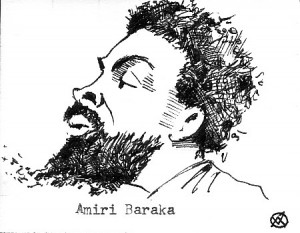 Incendiary poet and playwright — or old man playing with matches? Champion of the disenfranchised — or racist, anti-Semitic homophobe? There was never a consensus on the merits of the prolific writer who was born Leroy Jones, began publishing as LeRoi Jones, changed his name to Amiri Baraka, and died on Jan. 9 in his hometown of Newark, N.J., at 79.
Incendiary poet and playwright — or old man playing with matches? Champion of the disenfranchised — or racist, anti-Semitic homophobe? There was never a consensus on the merits of the prolific writer who was born Leroy Jones, began publishing as LeRoi Jones, changed his name to Amiri Baraka, and died on Jan. 9 in his hometown of Newark, N.J., at 79.
Regardless of what he called himself, the man was always going against the grain. Born into Newark’s black middle class, he dropped out of prestigious Howard University, then got a dishonorable discharge from the U.S. Air Force before melting into the bohemian hothouse of 1950s Greenwich Village. There he married a white woman named Hettie Cohen, who helped him found a literary magazine that published his work and that of many Beat notables. As his career took off — his poetry was gaining notice, his play Dutchman won an Obie Award, and he wrote perceptively about black music — he became increasingly radicalized. He shed his white wife and moved to Harlem, where he helped found the Black Arts Movement. The murder of Malcolm X in 1965 and Baraka’s savage beating by white cops during the 1967 Newark riot — which he called a rebellion — completed his radicalization.
The transformation, in some eyes, did not improve his writing. The poet and critic Kenneth Rexroth lamented that when the gifted Jones became the angry Baraka, he also became “a professional Race Man of the most irresponsible sort.” That dart resonated a year after the 9/11 terrorist attacks, when Baraka, then poet laureate of New Jersey, gave a public reading of his poem “Somebody Blew Up America.” It read, in part:
Who knew the World Trade Center
Was gonna get bombed
Who told 4000 Israeli workers at the
Twin Towers
To stay home that day
Why did Sharon stay away?
The poem’s anti-Semitic overtones led the New Jersey General Assembly to abolish the poet laureate’s post. Baraka fought the move in court, without success. Six months after Baraka’s death, his son Ras was elected mayor of Newark.
Peter Matthiessen
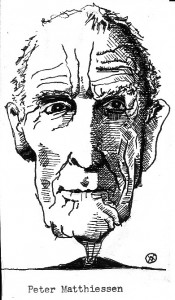 Peter Matthiessen could make just about anything interesting to readers. A restless naturalist who devoted himself to preserving the planet’s vanishing wilderness, Matthiessen produced more than 30 works of fiction and non-fiction on such subjects as Peruvian tribesmen, Long Island fishermen, Caribbean turtle hunters, the Pine Barrens of New Jersey, Florida cane planters, a safari in Tanzania, migrant farmworkers, and Native Americans. His human subjects were joined by a menagerie of white sharks, snow leopards, shore birds, and other exotic species. Matthiessen, who died on April 5 at 86, is the only writer ever to win National Book Awards for both fiction and non-fiction.
Peter Matthiessen could make just about anything interesting to readers. A restless naturalist who devoted himself to preserving the planet’s vanishing wilderness, Matthiessen produced more than 30 works of fiction and non-fiction on such subjects as Peruvian tribesmen, Long Island fishermen, Caribbean turtle hunters, the Pine Barrens of New Jersey, Florida cane planters, a safari in Tanzania, migrant farmworkers, and Native Americans. His human subjects were joined by a menagerie of white sharks, snow leopards, shore birds, and other exotic species. Matthiessen, who died on April 5 at 86, is the only writer ever to win National Book Awards for both fiction and non-fiction.
His resumé was nearly ridiculous. A son of privilege — which made him uneasy — Matthiessen grew up in an apartment on New York’s Fifth Avenue overlooking Central Park. He attended Hotchkiss, Yale, and the Sorbonne. In 1953 he co-founded The Paris Review, though it wasn’t until years later that it came out that the magazine was Matthiessen’s cover for his brief career as an operative for the C.I.A. He befriended a who’s Who of American letters, including William Styron, George Plimpton, and E.L. Doctorow. He became a commercial fisherman and a Zen priest.
Matthiessen’s last novel, In Paradise, was published three days after his death. He was a connoisseur of the world’s most unforgiving terrain right up to the end: the novel tells the story of a group of people who come together for a meditation retreat on the grounds of the Auschwitz-Birkenau death camp.
Sue Townsend
Too bad America hasn’t produce a satirist to skewer Ronald Reagan and the depredations he visited on America in the 1980s. England was blessed with Sue Townsend, a self-educated high school dropout whose fictional teenage misfit, Adrian Mole, got millions of readers to laugh at the highly Reaganesque bill of goods Margaret Thatcher sold to Great Britain during the 1980s.
 Adrian Mole may have grown up in a chronically underemployed working-class family and he may have attended shabby, underfunded schools, but he learned to love royal weddings. In adulthood, he fell victim to predatory lenders and wound up living in a converted pigsty — a nifty metaphor for the fallout of Thatcher’s merciless policies. Townsend, who died on April 10 at 68, shared Adrian’s grim upbringing and his ambivalent view of the Iron Lady. “Sometimes I think Mrs. Thatcher is a nice kind sort of woman,” he tells his diary in 1984’s The Growing Pains of Adrian Mole. “The next day I see her on television and she frightens me rigid. She has got eyes like a psychotic killer, but a voice like a gentle person. It is a bit confusing.”
Adrian Mole may have grown up in a chronically underemployed working-class family and he may have attended shabby, underfunded schools, but he learned to love royal weddings. In adulthood, he fell victim to predatory lenders and wound up living in a converted pigsty — a nifty metaphor for the fallout of Thatcher’s merciless policies. Townsend, who died on April 10 at 68, shared Adrian’s grim upbringing and his ambivalent view of the Iron Lady. “Sometimes I think Mrs. Thatcher is a nice kind sort of woman,” he tells his diary in 1984’s The Growing Pains of Adrian Mole. “The next day I see her on television and she frightens me rigid. She has got eyes like a psychotic killer, but a voice like a gentle person. It is a bit confusing.”
Gabriel Garcia Marquez
Few writers are as deeply loved by readers as Gabriel Garcia Marquez. His 1982 Nobel Prize for Literature, though deserved, was almost beside the point. He had already earned a writer’s most treasured honor: the devotion of millions of readers around the world.

 Like many of those readers, I came to his work through One Hundred Years of Solitude, a masterpiece of magical realism that I started reading on a fall day in 1974 and read straight through in two sleepless, nearly foodless, intoxicating days. The book changed my life, opened me to new worlds and new ways of seeing. As astonishing as it was — those all-night rains of yellow blossoms, those swamps of lilies oozing blood — I think Love in the Time of Cholera was an even better book. It teemed with fleshed-out characters and their potent emotions. It was less reliant on stylistic pyrotechnics and whimsy. It was earthier, meatier than its more famous predecessor. It showed us that love grows more solid the closer it comes to death.
Like many of those readers, I came to his work through One Hundred Years of Solitude, a masterpiece of magical realism that I started reading on a fall day in 1974 and read straight through in two sleepless, nearly foodless, intoxicating days. The book changed my life, opened me to new worlds and new ways of seeing. As astonishing as it was — those all-night rains of yellow blossoms, those swamps of lilies oozing blood — I think Love in the Time of Cholera was an even better book. It teemed with fleshed-out characters and their potent emotions. It was less reliant on stylistic pyrotechnics and whimsy. It was earthier, meatier than its more famous predecessor. It showed us that love grows more solid the closer it comes to death.
Other readers will have good reasons for preferring one or more of the other 15 books by the amazing Marquez, who died on April 17 at 87, having achieved the thing all writers yearn for, whether they admit it or not: immortality.
Maya Angelou
 Thirty-two years after Robert Frost recited “The Gift Outright” at John F. Kennedy’s presidential inauguration in 1961, Maya Angelou read her poem “On the Pulse of Morning” at Bill Clinton’s inauguration. Those events stand as twin pinnacles in the power and prestige of American poetry. But Angelou, who died on May 28 at 86, will probably be even more vividly remembered for her searing 1969 memoir about growing up in the Jim Crow South, I Know Why the Caged Bird Sings, one of the six volumes that recount the story of her remarkable life.
Thirty-two years after Robert Frost recited “The Gift Outright” at John F. Kennedy’s presidential inauguration in 1961, Maya Angelou read her poem “On the Pulse of Morning” at Bill Clinton’s inauguration. Those events stand as twin pinnacles in the power and prestige of American poetry. But Angelou, who died on May 28 at 86, will probably be even more vividly remembered for her searing 1969 memoir about growing up in the Jim Crow South, I Know Why the Caged Bird Sings, one of the six volumes that recount the story of her remarkable life.
After growing up mostly in Stamps, Ark., a small town brimming with “dust and hate and narrowness,” she traveled the world working as a dancer, calypso singer, streetcar conductor, prostitute, actress, magazine editor, college professor, and civil rights activist, associating with nobodies and with such notables as James Baldwin, Martin Luther King Jr., Malcolm X, Oprah Winfrey, and at least two U.S. presidents. Her poetry was more coolly received by critics than her memoirs, but her influence was undeniable. In 2011 she was awarded the Presidential Medal of Freedom, the nation’s highest civilian honor. And on the day she died, President Barack Obama remarked, “She inspired my own mother to name my sister Maya.”
Thomas Berger
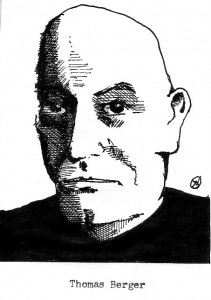 “Don’t try to fool an Indian who has seen a lot of white men.” So advises 111-year-old Jack Crabb, the unforgettable narrator of one of the greatest novels written by an American, Little Big Man. Its author, Thomas Berger, who died on July 13 at 89, will be long remembered for that astonishment of a novel, though too few readers realize that he produced two dozen others, as well as a sprinkling of stories and plays. In addition to the myths of the American West that he dissected so deftly in Little Big Man, Berger’s other great subject was the mores of the American middle class, whose deep-rooted paranoia he satirized wickedly in such novels as Neighbors (made into a 1981 movie starring John Belushi and Dan Ackroyd), The Feud, The Houseguest, and Best Friends. In these novels, routine social encounters have a way of morphing into comic horrors. A disciple of Franz Kafka, Berger’s range was vast. He wrote horror, pulp detective stories, science fiction, utopian fiction; he mined Greek tragedy, the survival saga, and the Camelot myth; he wrote about invisibility and time travel; his literary alter ego, Carl Reinhart, who appeared in several novels, was described as “representative of the unrepresented.”
“Don’t try to fool an Indian who has seen a lot of white men.” So advises 111-year-old Jack Crabb, the unforgettable narrator of one of the greatest novels written by an American, Little Big Man. Its author, Thomas Berger, who died on July 13 at 89, will be long remembered for that astonishment of a novel, though too few readers realize that he produced two dozen others, as well as a sprinkling of stories and plays. In addition to the myths of the American West that he dissected so deftly in Little Big Man, Berger’s other great subject was the mores of the American middle class, whose deep-rooted paranoia he satirized wickedly in such novels as Neighbors (made into a 1981 movie starring John Belushi and Dan Ackroyd), The Feud, The Houseguest, and Best Friends. In these novels, routine social encounters have a way of morphing into comic horrors. A disciple of Franz Kafka, Berger’s range was vast. He wrote horror, pulp detective stories, science fiction, utopian fiction; he mined Greek tragedy, the survival saga, and the Camelot myth; he wrote about invisibility and time travel; his literary alter ego, Carl Reinhart, who appeared in several novels, was described as “representative of the unrepresented.”
Once highly sociable, Berger in his later years became a recluse in a league with J.D. Salinger and Thomas Pynchon. Even his publisher and literary agent didn’t know how to get in touch with him. In a rare interview in 1980, Berger posed a rhetorical question: “Why does one write?” He answered, “I suspect that I am trying to save my own soul, but that’s nobody else’s business.”
Nadine Gordimer
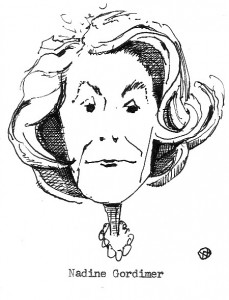 Nadime Gordimer cast a wide net in trying to capture the iniquity and human cost of apartheid in her native South Africa. She crossed lines of race, class, religion, and gender, bringing to life the cinderblock mazes of the black townships, the poolside barbecues of white society, the terror visited on those who resisted society’s rigid divisions. She brought to life Indian Muslims and mixed-race characters. Her Booker Prize-winning 1974 novel, The Conservationist, had a white male protagonist.
Nadime Gordimer cast a wide net in trying to capture the iniquity and human cost of apartheid in her native South Africa. She crossed lines of race, class, religion, and gender, bringing to life the cinderblock mazes of the black townships, the poolside barbecues of white society, the terror visited on those who resisted society’s rigid divisions. She brought to life Indian Muslims and mixed-race characters. Her Booker Prize-winning 1974 novel, The Conservationist, had a white male protagonist.
Gordimer, who died at age 90 on July 13 (the same day as Thomas Berger), wrote two dozen works of fiction, personal and political essays, and literary criticism over the course of a 60-year career. Some critics saw her personal struggle for liberation from her possessive mother as a mirror of her characters’ struggle against apartheid. Though she insisted she was not political by nature, she became engaged in the struggle — joining the banned African National Congress, passing messages, hiding friends from the police, driving people to the border — and she used many of these events in her fiction. The authorities were not pleased, and they banned three of her books, including one of her best known, Burger’s Daughter.

 On Feb. 11, 1990, after 26 years in captivity, Nelson Mandela walked out of Victor Verster Prison into the sun-washed streets of suburban Cape Town. The first person Mandela asked to see was Nadine Gordimer. A year later, she was awarded the Nobel Prize for Literature.
On Feb. 11, 1990, after 26 years in captivity, Nelson Mandela walked out of Victor Verster Prison into the sun-washed streets of suburban Cape Town. The first person Mandela asked to see was Nadine Gordimer. A year later, she was awarded the Nobel Prize for Literature.
Mark Strand
Mark Strand set out to be an artist. But while studying under the great colorist Josef Albers at Yale, Strand discovered poetry and embarked on a long and fruitful career that included a stint as U.S. poet laureate, a Pulitzer Prize, a Bollingen Prize for Poetry, and the publication of his selected poems last year. Strand, who died on Nov. 29 at age 80, was too dark for some tastes, but he insisted that his poems were “evenly lit.”
In the 1980s, after a decade and a half of publishing poems shadowed by death and dissolution, Strand became dissatisfied with the autobiographical vein of his work, and he stopped writing poetry. He turned to writing children’s books and short stories, books on the painters Edward Hopper and William Bailey, and a collection of critical essays. Late in life, he made collages with paper he had made by hand. Eventually he returned to writing a more expansive kind of poetry.
 In a Paris Review interview in 1998, the year before he won the Pulitzer Prize for Blizzard of One, Strand mused about death: “It’s inevitable. I feel myself inching towards it. So there it is in my poems. And sometimes people will think of me as a kind of gloomy guy. But I don’t think of myself as gloomy at all. I say ha ha to death all the time in my poems.”
In a Paris Review interview in 1998, the year before he won the Pulitzer Prize for Blizzard of One, Strand mused about death: “It’s inevitable. I feel myself inching towards it. So there it is in my poems. And sometimes people will think of me as a kind of gloomy guy. But I don’t think of myself as gloomy at all. I say ha ha to death all the time in my poems.”
Here’s one such ha ha, moment from the poem “The Remains,” in Strand’s 1970 collection, Darker:
I open the family album and look at myself as a boy.
What good does it do? The hours have done their job.
I say my own name. I say goodbye.
The words follow each other downwind.
I love my wife but send her away.
My parents rise out of their thrones
into the milky rooms of clouds.
How can I sing? Time tells me what I am.
I change and I am the same.
I empty myself of my life and my life remains.
Kent Haruf
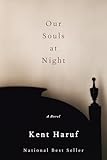
 Kent Haruf (rhymes with sheriff) staked out his patch of literary ground and never stopped working and reworking it. Like William Faulkner (Yoknapatawpha County), Gabriel Garcia Marquez (Macondo), Flannery O’Connor (rural Georgia), and Patrick Modiano (Paris during the Nazi Occupation), Haruf, who died on Nov. 30 at 71, became possessed by his chosen place. He called it Holt, a fictional small town on the high plains of eastern Colorado, a place of “pointless cruelty and simple decency,” where he set all of his fiction, including his 1999 breakthrough, Plainsong, and Our Souls at Night, which will be published posthumously in May.
Kent Haruf (rhymes with sheriff) staked out his patch of literary ground and never stopped working and reworking it. Like William Faulkner (Yoknapatawpha County), Gabriel Garcia Marquez (Macondo), Flannery O’Connor (rural Georgia), and Patrick Modiano (Paris during the Nazi Occupation), Haruf, who died on Nov. 30 at 71, became possessed by his chosen place. He called it Holt, a fictional small town on the high plains of eastern Colorado, a place of “pointless cruelty and simple decency,” where he set all of his fiction, including his 1999 breakthrough, Plainsong, and Our Souls at Night, which will be published posthumously in May.
Single-mindedness can lead to repetitiveness, and some critics noted that Haruf didn’t outdo himself with each new book; rather, he redid himself. One critic went so far as to compare Haruf’s prose to Pottery Barn furniture, with its “aged patina” and “rustic lines.” But Haruf’s many fans embraced the moral clarity of life in Holt — the town’s esteem for honest work, its belief in innocence as a virtue — and they saw the place as a refuge from the snark and irony and equivocation that fester beyond the rim of the high plains.
This list doesn’t pretend to be comprehensive, but there were a number of other literary deaths in 2014 that are worth mentioning. In alphabetical order they are:

 Norman Bridwell, creator of the Clifford children’s books; James MacGregor Burns, an award-winning political biographer and student of the art of leadership; Mary Cheever, the long-suffering wife of John Cheever, who published a book of her poems in 1980, two years before her husband’s death; P.N. Furbank, a British critic and scholar best known for his biography of E.M. Forster; Mavis Gallant, a master of the short story whose great subject was rootlessness; Doris Pilkington Garimara, an Australian Aborigine whose book about the government’s brutal campaign to eradicate the native population, Follow the Rabbit-Proof Fence, became the basis of the 2002 movie Rabbit-Proof Fence; Dermot Healy, the Irish novelist, poet, and memoirist regarded by many as a modern master in the mold of Flann O’Brien and Samuel Beckett; P.D. James, who became known as “The Queen of Crime” for her layered mysteries starring the dashing detective Adam Dalgliesh; Galway Kinnell, who won a Pulitzer Prize and a National Book Award for lyrical poems written to be understood, as he put it, without the help of a graduate degree; Alistair MacLeod, a Canadian writer whose lofty reputation was built on his single novel, No Great Mischief, and two collections of stories; the far more prolific Walter Dean Myers, who wrote more than 100 books, including best-selling children’s books centered on the lives of disenfranchised black kids; Alastair Reid, the peripatetic poet, New Yorker writer, and translator; Rene Ricard, an eighth-grade dropout, brilliant self-taught poet and art critic, painter, and movie actor, who Andy Warhol called “the George Sanders of the Lower East Side”; Louise Shivers, a late-blooming Southern writer who produced just two novellas but won rapturous praise and comparisons to Flannery O’Connor.
Norman Bridwell, creator of the Clifford children’s books; James MacGregor Burns, an award-winning political biographer and student of the art of leadership; Mary Cheever, the long-suffering wife of John Cheever, who published a book of her poems in 1980, two years before her husband’s death; P.N. Furbank, a British critic and scholar best known for his biography of E.M. Forster; Mavis Gallant, a master of the short story whose great subject was rootlessness; Doris Pilkington Garimara, an Australian Aborigine whose book about the government’s brutal campaign to eradicate the native population, Follow the Rabbit-Proof Fence, became the basis of the 2002 movie Rabbit-Proof Fence; Dermot Healy, the Irish novelist, poet, and memoirist regarded by many as a modern master in the mold of Flann O’Brien and Samuel Beckett; P.D. James, who became known as “The Queen of Crime” for her layered mysteries starring the dashing detective Adam Dalgliesh; Galway Kinnell, who won a Pulitzer Prize and a National Book Award for lyrical poems written to be understood, as he put it, without the help of a graduate degree; Alistair MacLeod, a Canadian writer whose lofty reputation was built on his single novel, No Great Mischief, and two collections of stories; the far more prolific Walter Dean Myers, who wrote more than 100 books, including best-selling children’s books centered on the lives of disenfranchised black kids; Alastair Reid, the peripatetic poet, New Yorker writer, and translator; Rene Ricard, an eighth-grade dropout, brilliant self-taught poet and art critic, painter, and movie actor, who Andy Warhol called “the George Sanders of the Lower East Side”; Louise Shivers, a late-blooming Southern writer who produced just two novellas but won rapturous praise and comparisons to Flannery O’Connor.
Through your words you will all live on.
Drawings by Bill Morris









